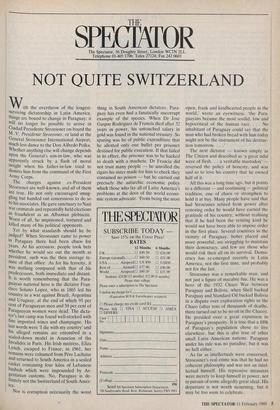SPECT THE AT OR The Spectator, 56 Doughty Street, London WC1N 2LL
Telephone 01-405 1706; Telex 27124; Fax 242 0603
NOT QUITE SWITZERLAND
With the overthrow of the longest- surviving dictatorship in Latin America, things are bound to change in Paraguay: it will no longer be possible to arrive in Ciudad Presidente Stroessner on board the M. V. Presidente Stroessner, or land at the General Stroessner International Airport, much less dance to the Don Alfredo Polka. Whether anything else will change depends upon the General's son-in-law, who was apparently struck by a flash of moral insight when his father-in-law tried to dismiss him from the command of the First Army Corps. The charges against ex-President Stroessner are well-known, and all of them are true. He not only encouraged smug- gling but handed out concessions to do so to his associates. 1-le gave sanctuary to Nazi war criminals and repeatedly held elections as fraudulent as an Albanian plebiscite. Worst of all, he imprisoned, tortured and killed many of his political opponents. Yet by what standards should he be judged? When Stroessner came to power in Paraguay there had been chaos for Years. At his accession, people took bets Whether he would see out the month as president, such was the then average te- nure of that office. As for his ferocity, ,it Was nothing compared with that of •his predecessors, both immediate and distant. It is worth remembering that the Para- guayan national hero is the dictator Fran- cisco Solano Lopez, who in 1865 led his country in a war against Brazil, Argentina and Uruguay, at the end of which 95 per cent of Paraguayan men and 50 per cent of Paraguayan women were dead. The dicta- tor's last camp was found well-stocked with fine imported wines and champagne. His last words were 'I die with my country' and his alleged remains are entombed in a scaled-down model in Asuncion of the Invalides in Paris. His Irish mistress, Eliza Lynch, escaped to France; in 1961, her remains were exhumed from Pere Lachaise and returned to South America in a sealed Casket containing four kilos of Lebanese hashish which were impounded by Ar- gentinian customs. No, Paraguay is de- finitely not the Switzerland of South Amer-
ica.
Nor is corruption necessarily the worst
thing in South American dictators. Para- guay has even had a fanatically uncorrupt example of the species. When Di. Jose Gaspar Rodriguez de Francia died after 32 years in power, his untouched salary in gold was found in the national treasury. So sparing was he of public expenditure that he allotted only one bullet per prisoner destined for public execution. If that failed in its effect, the prisoner was to be hacked to death with a machete. Dr Francia did not trust many people — he unrolled .the cigars his sister made for him to check they contained no poison — but he carried out precisely the autarchic economic policy which those who lay all of Latin America's problems at the door of the world econo- mic system advocate. 'From being the most open, frank and kindhearted people in the world,' wrote an eyewitness, 'the Para- guayans became the most sordid, low and hypocritical of the human race. . . No inhabitant of Paraguay could say that the man who had broken bread with him today might not be the instrument of his destruc- tion tomorrow....'
The next dictator — known simply as The Citizen and described as 'a great tidal wave of flesh. . . a veritable mastodon' reversed the policy of honesty, and was said so to love his country that he owned half of it.
All this was a long time ago, but it points to a different — and continuing — litical tradition, one of chaos or strongmen to hold it at bay. Many people have said that had Stroessner retired from power after restoring order he would have earned the gratitude of his country, without realising that if he had been the retiring kind he would not have been able to impose order in the first place. Several countries in the vicinity of Paraguay. better placed and more powerful, are struggling to maintain their democracy, and few are those who would risk their all on its survival. Demo- cracy has re-emerged recently in Latin America, not the first time, and probably not for the last.
Stroessner was a remarkable man, and not just a figure of macabre fun. He was a hero of the 1932 Chaco War between Paraguay and Bolivia, when Shell backed Paraguay and Standard Oil hacked Bolivia in a dispute over exploration rights in the Chaco (after tens of thousands of deaths, there turned out to be no oil in the Chaco). He presided over a great expansion in Paraguay's prosperity. It is true that a fifth of Paraguay's population chose to live elsewhere, but this is also true of other small Latin American nations. Paraguay under his rule was no paradise, but it was no hell either.
As far as intellectuals were concerned, Stroessner's real crime was that he had no coherent philosophy and was not an intel- lectual himself. His repressive measures were merely to keep himself in power, not in pursuit of some allegedly great ideal. His departure is not worth mourning, but it may be too soon to celebrate.


























































 Previous page
Previous page